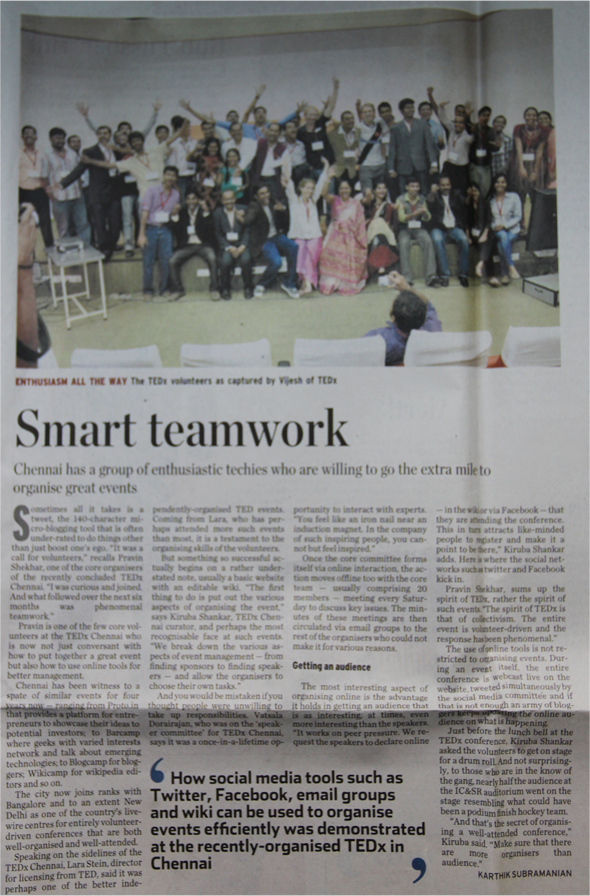Smart teamwork
Sometimes all it takes is a tweet, the 140-character micro-blogging tool that is often under-rated to do things other than just boost one’s ego. “It was a call for volunteers,” recalls Pravin Shekhar, one of the core organisers of the recently concluded TEDx Chennai. “I was curious and joined. And what followed over the next six months was phenomenal teamwork.”
Pravin is one of the few core volunteers at the TEDx Chennai who is now not just conversant with how to put together a great event but also how to use online tools for better management.
Chennai has been witness to a spate of similar events for four years now — ranging from Proto.in that provides a platform for entrepreneurs to showcase their ideas to potential investors; to Barcamp where geeks with varied interests network and talk about emerging technologies; to Blogcamp for bloggers; Wikicamp for Wikipedia editors and so on.
The city now joins ranks with Bangalore and to an extent New Delhi as one of the country’s livewire centres for entirely volunteer-driven conferences that are both well-organised and well-attended.
Speaking on the sidelines of the TEDx Chennai, Lara Stein, director for licensing from TED, said it was perhaps one of the better independently-organised TED events. Coming from Lara, who has perhaps attended more such events than most, it is a testament to the organising skills of the volunteers.
But something so successful actually begins on a rather under-stated note, usually a basic website with an editable wiki. “The first thing to do is put out the various aspects of organising the event,” says Kiruba Shankar, TEDx Chennai curator, and perhaps the most recognisable face at such events. “We break down the various aspects of event management — from finding sponsors to finding speakers — and allow the organisers to choose their own tasks.”
And you would be mistaken if you thought people were unwilling to take up responsibilities. Vatsala Dorairajan, who was on the ‘speaker committee’ for TEDx Chennai, says it was a once-in-a-lifetime opportunity to interact with experts. “You feel like an iron nail near an induction magnet. In the company of such inspiring people, you cannot but feel inspired.”
Once the core committee forms itself via online interaction, the action moves offline too with the core team — usually comprising 20 members — meeting every Saturday to discuss key issues. The minutes of these meetings are then circulated via email groups to the rest of the organisers who could not make it for various reasons.
Getting an audience
The most interesting aspect of organising online is the advantage it holds in getting an audience that is as interesting, at times, even more interesting than the speakers. “It works on peer pressure. We request the speakers to declare online — in the wiki or via Facebook — that they are attending the conference. This in turn attracts like-minded people to register and make it a point to be there,” Kiruba Shankar adds. Here is where the social networks such as twitter and Facebook kick in.
Pravin Shekhar, sums up the spirit of TEDx, rather the spirit of such events. “The spirit of TEDx is that of collectivism. The entire event is volunteer-driven and the response has been phenomenal.”
The use of online tools is not restricted to organising events. During an event itself, the entire conference is webcast live on the website, tweeted simultaneously by the social media committee and if that is not enough an army of bloggers keeps updating the online audience on what is happening.
Just before the lunch bell at the TEDx conference, Kiruba Shankar asked the volunteers to get on stage for a drum roll. And not surprisingly, to those who are in the know of the gang, nearly half the audience at the IC&SR auditorium went on the stage resembling what could have been a podium finish hockey team.
“And that’s the secret of organising a well-attended conference,” Kiruba said. “Make sure that there are more organisers than audience.”
